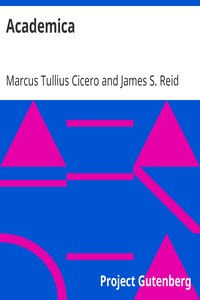Academica by Marcus Tullius Cicero
"Academica" by Marcus Tullius Cicero is a philosophical treatise that likely dates back to the late Roman Republic period. This work delves into the nature of knowledge and the intricacies of epistemology, as Cicero explores the tenets of various philosophical schools and their implications on human understanding. Through the dialogues presented in the text, Cicero engages with significant figures from different philosophical traditions, particularly the Academics, Stoics, and Epicureans. At the start
of "Academica," Cicero reflects on his journey as a philosophy student, detailing his early influences from notable philosophers such as Phaedrus, Diodotus, and Philo of Larissa. He illustrates how these encounters shaped his understanding and appreciation of philosophy, particularly the Academic school's emphasis on skepticism and the pursuit of truth. The opening portion sets the stage for a deeper exploration of philosophical questions, as Cicero wrestles with the challenges posed by dogmatism, providing a foundation for the discussions and debates that will unfold in the subsequent sections of the work. (This is an automatically generated summary.)
Read or download for free
| How to read | Url | Size | |||
|---|---|---|---|---|---|
| Read now! | https://www.gutenberg.org/ebooks/14970.html.images | 884 kB | |||
| EPUB3 (E-readers incl. Send-to-Kindle) | https://www.gutenberg.org/ebooks/14970.epub3.images | 377 kB | |||
| EPUB (older E-readers) | https://www.gutenberg.org/ebooks/14970.epub.images | 388 kB | |||
| EPUB (no images, older E-readers) | https://www.gutenberg.org/ebooks/14970.epub.noimages | 371 kB | |||
| Kindle | https://www.gutenberg.org/ebooks/14970.kf8.images | 775 kB | |||
| older Kindles | https://www.gutenberg.org/ebooks/14970.kindle.images | 586 kB | |||
| Plain Text UTF-8 | https://www.gutenberg.org/ebooks/14970.txt.utf-8 | 627 kB | |||
| Download HTML (zip) | https://www.gutenberg.org/cache/epub/14970/pg14970-h.zip | 363 kB | |||
| There may be more files related to this item. | |||||
Similar Books
About this eBook
| Author | Cicero, Marcus Tullius, 107 BCE-44 BCE |
|---|---|
| Editor | Reid, James S. (James Smith), 1846-1926 |
| Title | Academica |
| Note | Wikipedia page about this book: https://en.wikipedia.org/wiki/Academica_(Cicero) |
| Credits |
Produced by Ted Garvin, Keith Edkins and the PG Online Distributed Proofreading Team |
| Reading Level | Reading ease score: 65.9 (8th & 9th grade). Neither easy nor difficult to read. |
| Language | English |
| Language | Latin |
| LoC Class | PA: Language and Literatures: Classical Languages and Literature |
| Subject | Philosophy -- Early works to 1800 |
| Subject | Knowledge, Theory of -- Early works to 1800 |
| Category | Text |
| EBook-No. | 14970 |
| Release Date | Feb 8, 2005 |
| Most Recently Updated | Dec 19, 2020 |
| Copyright Status | Public domain in the USA. |
| Downloads | 497 downloads in the last 30 days. |
| Project Gutenberg eBooks are always free! | |

